Table of Contents
11 Life-Changing Holistic Habits to Transform Your Well-Being
This page may contain affiliate links. We may earn a commission on purchases, at no additional cost to you. Learn more →
Have you ever felt overwhelmed by the endless stream of health advice but unsure where to start? I know that feeling all too well. After struggling with chronic migraines for years, I discovered that small, consistent holistic habits were the key to reclaiming my health and vitality. Today, I'm sharing the science-backed practices that not only helped me become migraine-free but continue to support my overall wellbeing.
Life today moves at lightning speed, making it difficult to slow down. Between technological advances and the self-improvement culture, we rarely take time for ourselves to incorporate holistic habits to take care of ourselves.
The reality is stark - over 280 million people struggle with depression globally, while chronic illnesses continue rising due to poor diet, physical inactivity, and chronic stress. But there's hope in taking a holistic approach to health.
Luckily for you, you have information right at your fingertips ! In this guide, I’ll share 11 proven, science-backed habits to help you take control of your well-being, starting today.

What Does Holistic Mean?
The word "holistic" originates from the Greek word holos, meaning "whole" or "entire." " It is commonly used in contexts where an integrated or comprehensive perspective is essential. Holistic approaches aim to address multiple aspects of a system, recognizing that these aspects are interdependent and cannot be fully understood in isolation.
So holistic health is a practice that recognizes the connection between the mind, body, and spirit. Instead of focusing on symptoms, it looks at your well-being, aiming to nourish every aspect of your life!
Holistic health has deep roots in ancient medical systems. Two of the most influential traditions that shaped holistic health are Ayurveda from India and Traditional Chinese Medicine (TCM) from East Asia. These systems have been practiced for thousands of years and continue to influence modern approaches to well-being.
Core Principles of Holistic Approaches
-
Interconnectedness: Recognizing that all parts of a system are connected and influence one another.
-
Balance: Striving for harmony among various components.
-
Integration: Combining multiple perspectives or methods to address issues comprehensively.
-
Personalization: Adapting approaches to individual needs or contexts.
Why Holistic Habits Matters Today
Holistic habits are simple, everyday practices that bring balance and ease to your day. By making intentional choices about your habits, you prioritize how you want to feel, taking charge of your well-being.
In today's fast-paced world, these are essential - helping you to manage stress, improve health, and foster a deeper connection with yourself and the world around you.
Instead of just treating symptoms, holistic habits build a foundation for lasting wellbeing by:
-
Stress and anxiety reduction: Mindfulness and meditation programs can reduce your stress levels by 20-30%, whilst improving anxiety and depression symptoms!
-
Boosting immunity: Studies show that long-term meditation and physical exercise boost immune function and enhance brain activity related to attention
-
Mental Clarity: Regular habits of expressing gratitude and mindfulness can significantly lower anxiety and boost cognitive function
-
Supporting natural healing processes
-
Creating sustainable energy and vitality
There benefits to holistic living are endless. However, it's not about making drastic changes all at once; but about taking small, sustainable steps in a way that feels natural to you.
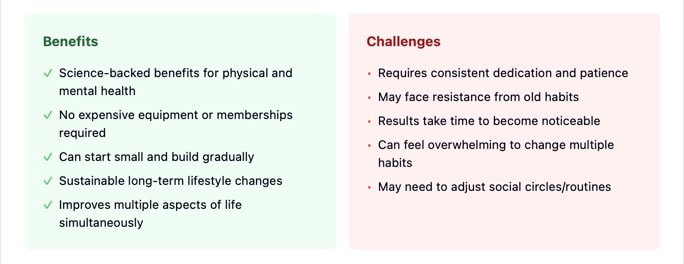
11 Daily Holistic Practices: Merging Simplicity with Impact
Let's explore each habit in detail, with clear steps to implement them in your daily life.
Holistic Habits #1: Master Mindfulness
Mindfulness is a powerful, science-backed practice that improves emotional regulation, focus, and stress levels. Who wouldn't want that? What's great is that meditation can be as short or as long as you'd like, and there are plenty of apps to help guide you through it.
Dr. Joe Dispenza explains that practicing mindfulness and meditation can rewire your brain, making it more resilient: " With a single intervention, we've seen profound changes and improvements for multiple health conditions. And there are no 'side effects', unless you count a newfound love for life - and for yourself"
A 2011 study in Neuroimage even showed that mindfulness strengthens connections in the brain related to attention and sensory processing!
Actionable Steps:
-
Morning meditation: Start your day with meditation. Apps like Calm and Headspace, or free YouTube guided sessions (my favourite!) are great options! With so many choices, you can pick the voice and vibe that feels right!
-
Layer mindfulness into your day: You don't always need dedicated meditation. I often practice mindfulness by paying attention to the details of everyday tasks like walking, cooking, or washing dishes. Fully immerse your senses!
-
Listen to mindfulness playlists: Try listening to music at 432 Hz on YouTube and Spotify to help ground yourself!
-
Journalling: My favorite practice! Journalling each morning and evening clears my head and helps me process my thoughts. The Day One app is great for digital journalling if that's your preference!
Further experts and sources:
Dr. Kelly McGonigal, Book: The Upside of Stress*
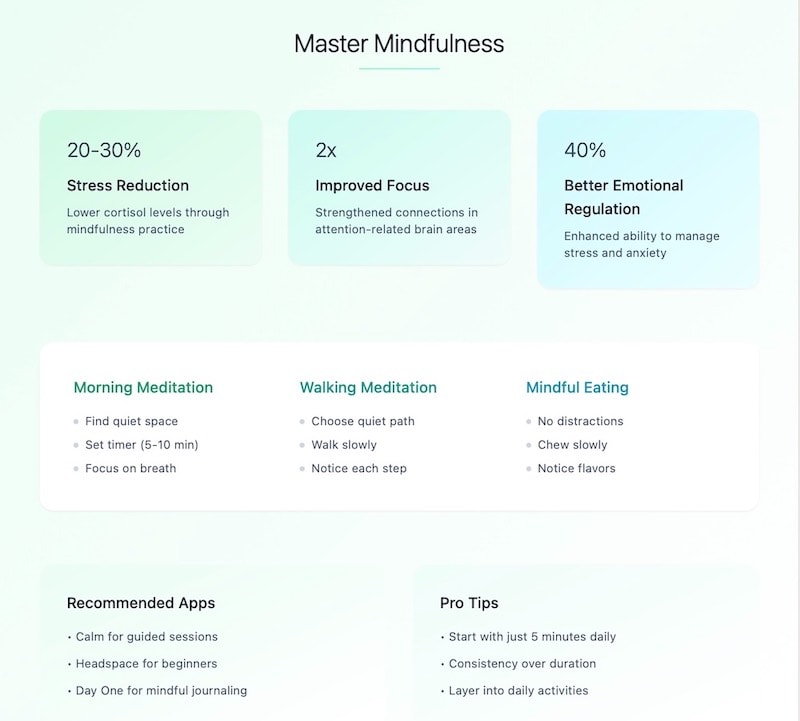
Healthy Habits #2. Nourish Your Body: Food as Medicine
Whole, nutrient-dense foods are the foundation of good health. They support cellular repair and prevent deficiencies. Studies from the world's Blue Zone—regions with the healthiest, longest-living populations—show that plant-based diets with small amounts of animal products are key to longevity and low chronic disease rates. These diets emphasize whole grains, legumes, vegetables, fruits, and healthy fats like olive oil. (I recommend the Netflix documentary).
The secret? Seeing food as nourishment and fuel, not restriction. Shift your mindset and prioritize vibrant, nutrient-rich whole foods to support muscle and cellular repair.
Experts:
Dr. Mark Hyman “Food is not just calories, it’s information—it talks to your DNA and tells it what to do.” Book: Food: What the Heck Should I Eat?
Paul Check, a Holistic Health Practitioner, Book: How to Eat, Move and Be Healthy!
Key areas to focus on:
-
Intermittent Fasting (IF): A science-backed way to sync your eating with your body's natural rhythm, promoting energy and metabolism, while improving insulin sensitivity and reducing inflammation.
-
For women, circadian fasting (eating during daylight hours) allows for alignment with your hormonal cycles, optimizing energy levels.
-
Superfoods for Longevity: Foods like blueberries, broccoli or turmeric, amongst many others, are rich in antioxidants and bioactive compounds that support immune health, reduce inflammation, and promote overall well-being.
-
Hydration Tips: Proper hydration is essential for maintaining overall health. Opt for filtered water as your primary source of hydration and include water-rich foods like cucumber in your diet.
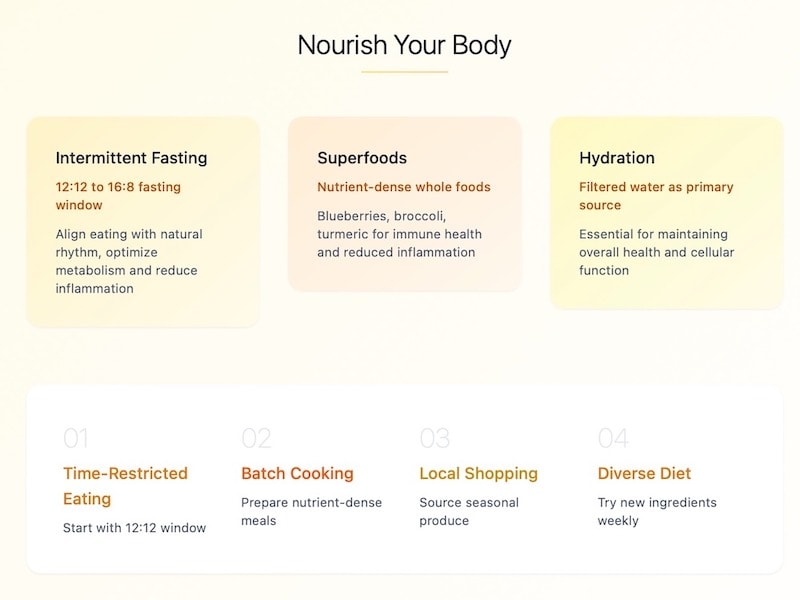
Actionable Steps:
-
Time-Restricted Eating: Begin with a 12:12 fasting window, gradually moving to 16:8 for enhanced metabolism
-
Batch cook nutrient-dense meals to avoid making unhealthy food choices: Prepare meals in advance using whole foods like grains, legumes, vegetables, and healthy fats.
-
Shop at farmers’ markets for seasonal organic produce to support your community, and ensure your food is fresh and full of nutrients
-
Diversify your microbiome: Your gut thrives on variety; challenge yourself to try one new recipe or ingredient each week, and a diverse diet rich in fiber from fruits, vegetables, legumes, and whole grains to promote gut health.
Healthy Habits #3: Move your Body Everyday
Movement is a cornerstone of physical and mental well-being. If I had to choose just one habit to prioritize, it would be this one. Moving your body daily not only reduces stress and anxiety, but it also makes you stronger and boosts your cardiovascular health - and you feel great afterward!
Studies show that exercising at least 500 minutes (~ 8 hours) per week lowers your risk of cardiovascular events by 17% and reduces anxiety-related events by 22%. One study found that exercise can be as effective as therapy or antidepressants for reducing depression!
Key Areas to Focus On
-
Daily Movement for Mental Health
-
Strength Training for Longevity: Building muscle is crucial for aging well, preventing disability, and reducing all-cause mortality. Research shows that greater muscle strength correlates with a all-cause mortality deriction by 15%, even among older adults.
-
Exercise Snacks: Short bursts of movement throughout the day can be just as impactful as longer workouts.
Actionable Steps:
-
Quick 10-minute walks: Start your day with a walk around the block or park - I personally love doing this at lunchtime to clear my mind, and stretch my legs!
-
Incorporate Exercise snacks: Try incorporating 10 bodyweight squats every hour. This simple habit can improve your blood sugar regulation more than a 30-minute walk!
-
Strength Training Routine:
-
Begin with simple exercises like squats, lunges, or resistance band workouts.
-
Aim for two sessions per week focused on building muscle strength.
-
PRO Tip: Consider trying heat therapy (sauna) or cold plunges to amplify the benefits of your workouts and improve muscle recovery
Experts and further reading:
Dr. Kelly McGonigal: “Movement is one of the most powerful ways to build emotional strength.” Book: The Joy of Movement
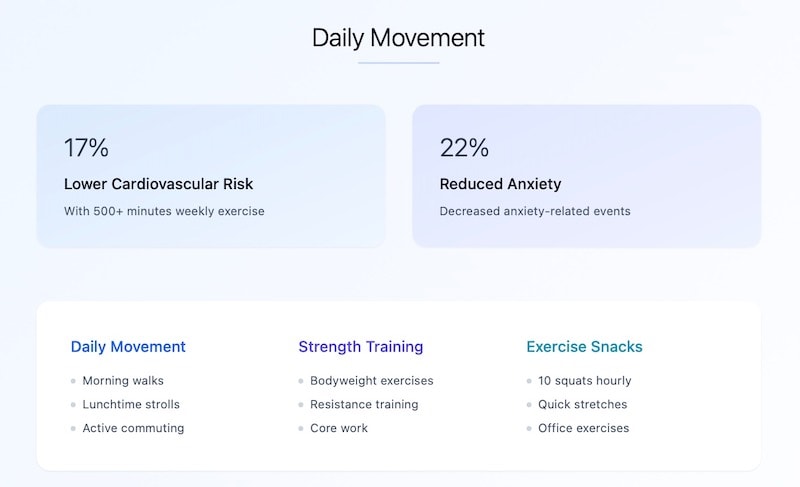
Holistic Habits #4: Cultivate Gratitude & Practicing Self-Compassion
Gratitude and self-compassion are transformative practices that can profoundly improve your mindset, reducing burnout and increasing resilience. These habits not only enhance mood and happiness but also strengthen relationships and improve your ability to navigate life's challenges. Research supports the profound impact of these practices:
-
In The Little Book of Gratitude, Robert Emmons notes that practicing gratitude can lower cortisol levels—the body's primary stress hormone—by approximately 23%, which in turn positively affects metabolism, immune function, and overall stress regulation.
-
Self-compassion has been shown to reduce self-criticism, improve emotional resilience, and promote healthier coping mechanisms during times of stress or adversity
Actionable Steps:
-
Gratitude journaling: Write down what you're grateful for daily, or use apps like Grateful, which lets you do this on your phone
-
Bedtime reflections: Before sleep, reflect on the highlights of your day e.g. a delicious meal, or a smile from a stranger - no matter how small
-
Create self-care rituals: Take time to nurture yourself with activities like reading, enjoying a bath, or using a face mask. Prioritize kindness to yourself!
-
Self-Compassion Journal: When facing challenges, write about them as if you were comforting a close friend. This exercise helps reframe negative self-talk into supportive inner dialogue.
-
Affirmations: Use positive affirmations like "All is well" or "I am loved" to counteract self-critical thoughts.
Experts and further Reading:
Dr. Tara Swart “Gratitude rewires your brain to seek positivity, which reinforces emotional resilience.” Book: The Source
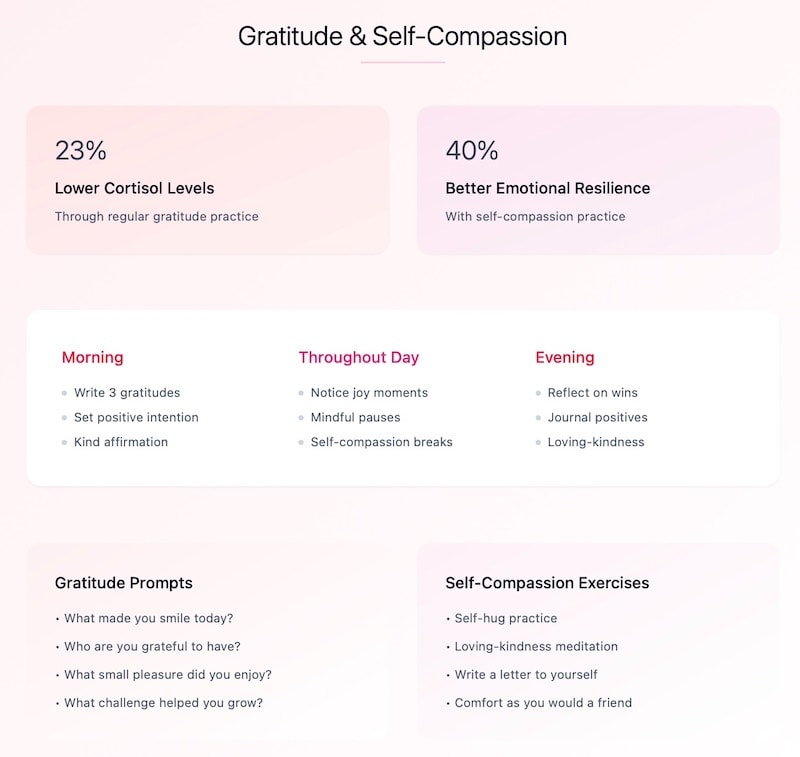
Healthy Habits #5: Go Outdoors and Connect with Nature
Research shows that even short periods outdoors can significantly reduce stress, lower anxiety, improve mood, and boost cognitive function. A study published in Nature revealed that just 20 minutes in a natural environment can lower cortisol levels—the body's primary stress hormone—making it a simple yet powerful way to combat stress and enhance mental clarity.
Actionable Steps:
-
Ground yourself: Walking barefoot on the earth can reduce stress, and improve your sleep and mood significantly!
-
Plan weekend hikes or outdoor workouts: Swap the treadmill for a trail. Outdoor exercise not only boosts your fitness but also sharpens your mind, leaving you feeling refreshed. Use apps like AllTrails to discover nearby hiking trails or outdoor fitness spots.
-
Bring the nature inside: As a plant mum myself, I am an advocate for surrounding yourself with plants and fresh flowers to boost your creativity and air quality! Consider low-maintenance plants like snake plants or pothos if you're new to plant care.
Experts and further Reading:
Dr. Dean Ornish : “A combination of healthy habits, not pills, is the most powerful tool for disease reversal.” Book: Undo It! (co-authored with Anne Ornish)
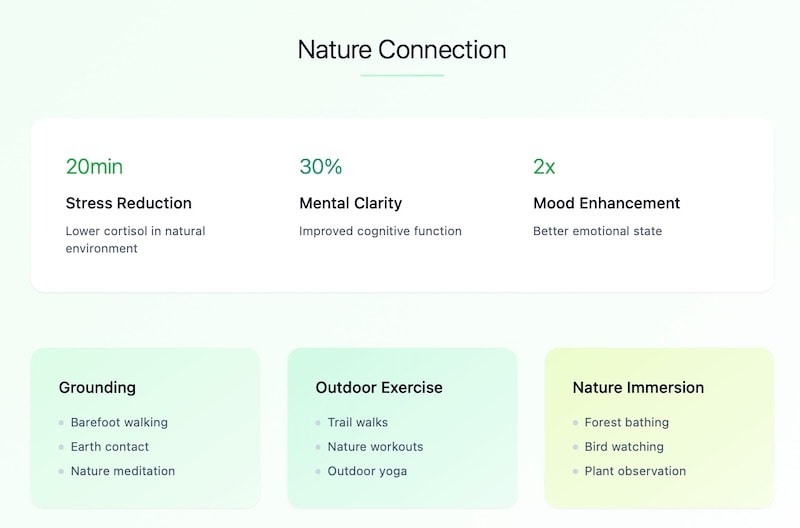
Healthy Habits #6: Foster Healthy Relationships
The people in your life that make you laugh, or share quiet moments with, these connections aren't just nice to have, they are essential. Harvard's 80-year-old study shared in the 'The Good Life' revealed that strong relationships not only boost happiness but are also pivotal to your health and longevity. People with meaningful connections experience less stress, and mental health issues and also live longer.
Actionable Steps:
-
Host intentional gatherings: Invite a few friends over for a dinner, or a casual hangout. The moments create deeper, more meaningful connections!
-
Join a group or community: Whether it's volunteering, a book club, or a hiking group, putting yourself out there helps you meet like-minded people
-
Practice active listening: Next time you're with someone, fully focus on what others are saying without planning your response. This strengthens your relationships and shows genuine care
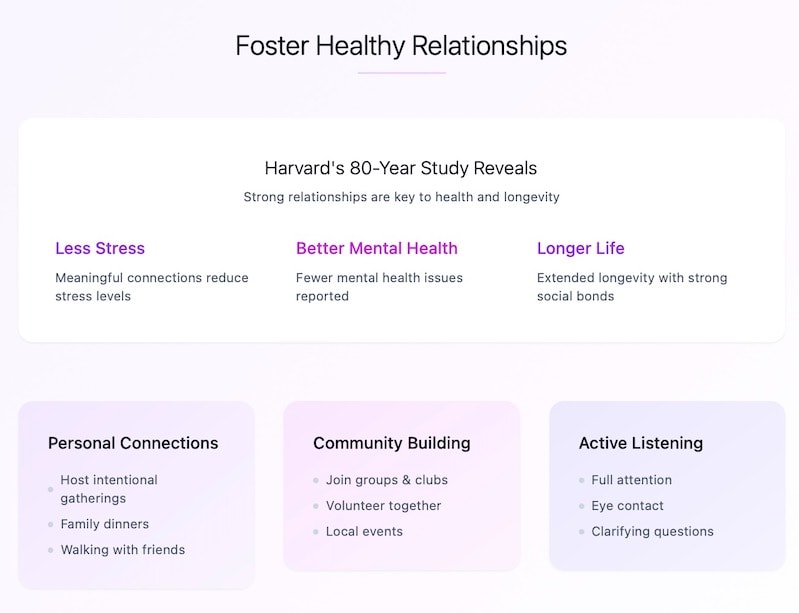
Holistic Habits #7: Digital Detox for Mind and Space
Too much screen time or cluttered spaces can leave you feeling drained and overwhelmed. Research shows that constant exposure to digital technologies can make mpair concentration, stifle creativity, and even foster feelings of isolation. In fact, 48% of people in the US reported feeling addicted to their devices.
A digital detox—a deliberate break from technology—can help reduce dependency, improve sleep, and lower stress levels, creating more balance in your life.
Actionable Steps for a Digital Detox
-
Schedule detox days: Set aside a day or weekend to unplug, take a break from social media, and indulge in activities you often feel 'too busy' for
-
Create screen-free zones: Keep devices out of your bedroom, dining room, and bathroom to limit over-exposure
-
Time block your digital life: Allocate specific times for checking your emails or scrolling to social media - and stick to them!
-
Limit Blue Light Exposure and Balance with Natural Light
-
Use blue-light glasses and adjust device setting: If you are using digital devices, you can use blue-light glasses or use night mode on your phone to protect your eyes and reduce strain!
-
Explore red light therapy: this innovative biohack is becoming increasingly popular, known for its calming effects and for improving your sleep
-
Embrace natural light: Spending time outdoors, especially at sunrise and sunset can boost melatonin production and align your circadian rhythm
-
Start small: unplug for an hour today or set up a screen-free zone in your home—you’ll be amazed at how much lighter and more present you feel!
Holistic Habits #8: Cleanse Your Liver/ Juice Detox Your body
Feeling sluggish and low on energy is a common experience in today’s fast-paced world, often due to stress, overindulgence, and exposure to toxins in food, water, and the environment. Your liver, the body’s natural detoxifier, plays a crucial role in processing these toxins. However, it can sometimes feel overworked. Supporting your liver through fasting or juice detoxing can help restore balance and vitality
Fasting has been shown to trigger remarkable processes in the body, such as detoxification and neurogenesis (the creation of new brain cells)
During fasting, the digestive system takes a break, allowing the body to redirect energy toward cleansing and healing. Barbara O’Neill, a renowned natural health expert, describes the liver as the “project manager” of detoxification. This process occurs in three phases:
What Happens During Fasting?
1. Phase One: Fat-soluble toxins are converted into metabolites, which are highly reactive and produce free radicals.
2. Phase Two: Metabolites are neutralized by antioxidants and amino acids, transforming them into water-soluble compounds.
3. Phase Three: Water-soluble toxins are eliminated through sweat, urine, and bowel movements.
To support these detoxification phases, it’s crucial to consume nutrient-dense juices, such as juices rich in beta-carotenes (e.g., carrots and leafy greens), vitamin C, vitamin E, and minerals like those found in Celtic sea salt.
So a juice detox can be a valuable addition to a non-toxic lifestyle, providing your liver with a much-needed break while delivering an influx of nutrients to support its function.
Fasting Tips for Beginners:
-
Start with regular intermittent fasting instead of prolonged fasts to avoid overwhelming your body with the release of toxins.
-
Begin with a 1-day juice detox and gradually work up to 3 days as your body adjusts.
Further Experts and reading:
Dr. Valter Longo: “Periodic fasting reboots the immune system and promotes cellular regeneration.” Book: The Longevity Diet
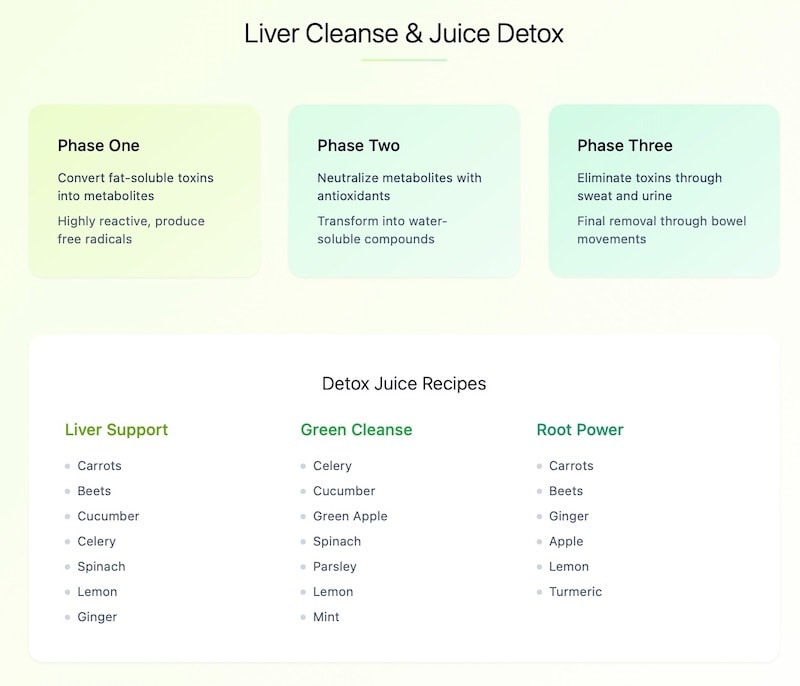
Actionable Steps:
-
Start Small: Try a 1-day juice detox and work up to 3 days as your body adjusts for greater benefits
-
Choose Organic Ingredients: Choose organic products like carrots, beets, cucumbers, celery, spinach, lemon and ginger to support liver function and digestion.
-
Include Protein: Add a plant-based protein source, such as pea protein or hemp protein powder, to your juices. This provides the amino acids necessary for the liver’s detoxification process and helps to neutralize toxins.
-
Avoid Toxins: During your fast, steer clear of caffeine, alcohol, and processed foods to maximize the benefits.
-
Add detox foods daily: If juicing isn’t for you, incorporate liver-supporting foods into your meals, such as leafy greens, cruciferous vegetables (e.g., broccoli and kale), or green teas, which naturally promote liver health.
Daily Holistic Habits #9: Build Resilience with Hormesis
Did you know you can train your body to better handle stress and grow stronger with hormesis - which is exposing yourself to controlled stressors like cold plunges and saunas?
Practices like cold plunges and sauna sessions are excellent examples of hormetic stressors that train your body to adapt, grow stronger, and better handle physical and mental stress. These practices not only boost resilience but also enhance immunity, cardiovascular health, and mental clarity.
Research supports the powerful benefits of these practices:
-
Sauna Use: A study published in JAMA Internal Medicine found that regular sauna use (4–7 times per week) reduces cardiovascular-related mortality by 40%.
-
Cold Exposure: Cold water immersion at 10–15°C (50–60°F) has been shown to decrease stress and may even slow the progression of neurodegenerative diseases
As Wim Hof, known as the "Ice Man," explains, “Cold is a stressor, so if you can control your body’s response to it, you can control stress.”
Actionable Steps:
-
Combine sauna and cold therapy: Alternate between sauna sessions (15–20 minutes) and cold plunges (1–3 minutes) to boost circulation, reduce inflammation, and enhance resilience. This combination creates a powerful contrast therapy that leaves you feeling refreshed and energized.- I can guarantee you will feel better afterward!
-
Ease into cold exposure: Whilst initially daunting - start with 30 seconds of cold water at the end of your shower, and increase gradually. You will feel energised and it will boost your focus and mood!
-
Incorporate heat therapy: Add sauna sessions to your routine for a rush of endorphins, maybe after a swim? Remember to listen to your body and avoid overdoing it - moderation is key!
Pro Tips for Hormetic Practices
-
Hydration Is Key: Always hydrate before and after sauna or cold therapy sessions to replenish lost fluids.
-
Make It Routine: Aim for 2–3 sessions per week for consistent benefits.
Further Experts and Reading:
Dr. Andrew Huberman : “Deliberate cold exposure increases dopamine by 250%, leading to enhanced mood and focus.”
Dr. Rhonda Patrick: “Heat exposure through sauna use has been shown to reduce cardiovascular mortality by up to 40%.”
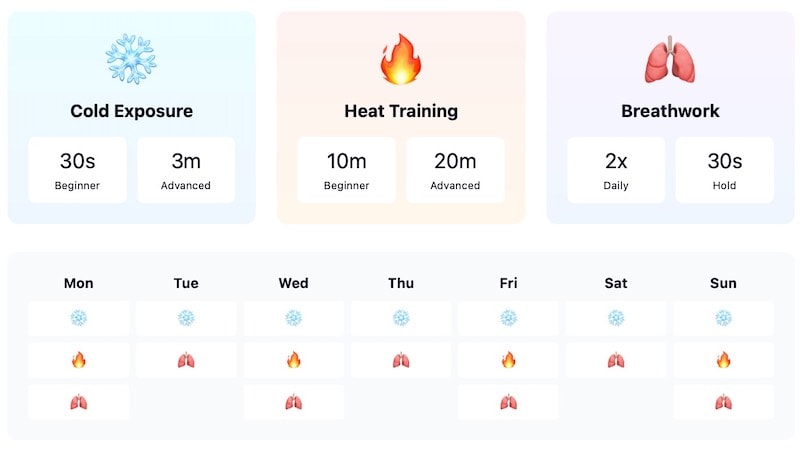
Daily Holistic Habits #10. Prioritize Restful Sleep
When sleep suffers, everything in life feels harder. Quality sleep is essential for mental clarity, hormone regulation, and immune function, and is a cornerstone of holistic health and overall well-being.
Dr. Michael Twery, a sleep experat the NIH, emphasizes that “Sleep affects every tissue in our bodies. It impacts growth and stress hormones, our immune system, appetite, breathing, blood pressure, and cardiovascular health.”
We as adults typically need at least 8 hours of sleep per night, while children and teenagers require even more to support their development.
Poor sleep or irregular sleep patterns can disrupt circadian rhythms—the body’s internal clock—which can lead to cognitive impairments, memory issues, emotional instability, and even chronic health conditions like hypertension or cardiovascular disease
Prioritizing high-quality sleep is one of the most impactful habits for your holistic health!
Actionable Steps to Transform Your Sleep
-
Create a tech-free evening ritual: Avoid screens 1-2 hours before bed to reduce blue light exposure. I personally do yoga or meditation before bed to help me unwind and prepare for rest!
-
Optimize your sleep environment:
-
Use blackout curtains
-
maintain a cool room temperature (around 18–20°C or 65–68°F)
-
and invest in a comfortable bed with breathable sheets or even a weighted blanket for better sleep quality - it's worth it to optimize sleep length and quality.
-
Minimize noise with earplugs or white noise machines if necessary.
-
-
Try Holistic sleep aids:
-
Herbal teas like chamomile or ginger and lemon tea (a fave of mine) before bed are great for relaxation.
-
Magnesium supplements are also great for relaxing the nervous system, and supporting a restful night's sleep too!
-
Experiment with aromatherapy using lavender essential oil to create a calming bedtime atmosphere.
-
-
Consistency is key: Going to bed and waking up at the same time daily (yes, even on weekends) helps regulate your circadian rhythm and makes your sleep more restorative too.
Pro Tips for Better Sleep
-
Limit Caffeine: Avoid caffeine in the afternoon or evening as it can interfere with your ability to fall asleep.
-
Time Your Meals: Finish eating at least 2–3 hours before bedtime to prevent disruptions caused by digestion.
-
Incorporate Physical Activity: Regular exercise improves sleep quality but avoid intense workouts close to bedtime as they may keep you awake.
Further Reading and Experts:
Dr. Matthew Walker “Sleep is the single most effective thing we can do to reset our brain and body health each day.” Book: Why We Sleep: Unlocking the Power of Sleep and Dreams
Daily Holistic Habits #11: Breathwork (Connected & Box Breathing)
Breathwork is a powerful and accessible tool for improving physical, mental, and emotional well-being. It involves intentional breathing techniques that regulate the autonomic nervous system, optimize oxygen flow, and help manage stress and anxiety. Dr. Andrew Huberman highlights breathwork’s ability to rapidly lower stress and increase focus by balancing oxygen (O2) and carbon dioxide (CO2) levels in the body.
Why It Matters
-
Physiological Regulation: Proper breathing calms the sympathetic nervous system (fight-or-flight) and activates the parasympathetic (rest-and-digest). Regulates parasympathetic vs sympathetic activation, crucial for hormone harmony.
-
Oxygen Optimization: Techniques like connected (circular) breathing ensure continuous oxygen flow, which can stabilize mood and energy levels.
-
Stress & Anxiety Control: Techniques like box breathing (4-4-4-4) quickly calm racing thoughts and reduce perceived stress. Research in Sleep Science (2020) revealed that box breathing reduces sympathetic arousal, helping individuals fall asleep faster and achieve deeper rest.
-
Cortisol Reduction: a 2019 study in BMC Complementary Medicine and Therapies demonstrated that daily breathwork significantly lowers cortisol levels, improving subjective well-being.
-
Neuroplasticity: Breathwork promotes positive neuroplasticity by enhancing focus and emotional regulation, as supported by studies on mindfulness practices that incorporate breathing techniques
Some Types of Breathwork
-
Connected (Circular) Breathing: Continuous inhalation and exhalation with no pause in between.
-
Box Breathing (4-4-4-4): Inhale for 4s, hold 4s, exhale 4s, hold 4s.Particularly helpful before sleep or to manage acute stress. Navy SEALs use this technique to steady nerves under pressure.
-
Alternate Nostril Breathing (Nadi Shodhana): Involves alternating breaths through each nostril to balance energy flow.
Further Readings and Experts
Dr. Belisa Vranich: “Most people breathe inefficiently—learning to breathe properly can transform your energy levels.” Book: Breathe: The Simple, Revolutionary 14-Day Program to Improve Your Mental and Physical Health
Dr. Andrew Huberman: “Controlled breathing directly influences the autonomic nervous system, helping reduce stress and improve focus.”
James Nestor : “How you breathe affects every aspect of your health—your energy, focus, and even longevity.” Book: Breath: The New Science of a Lost Art
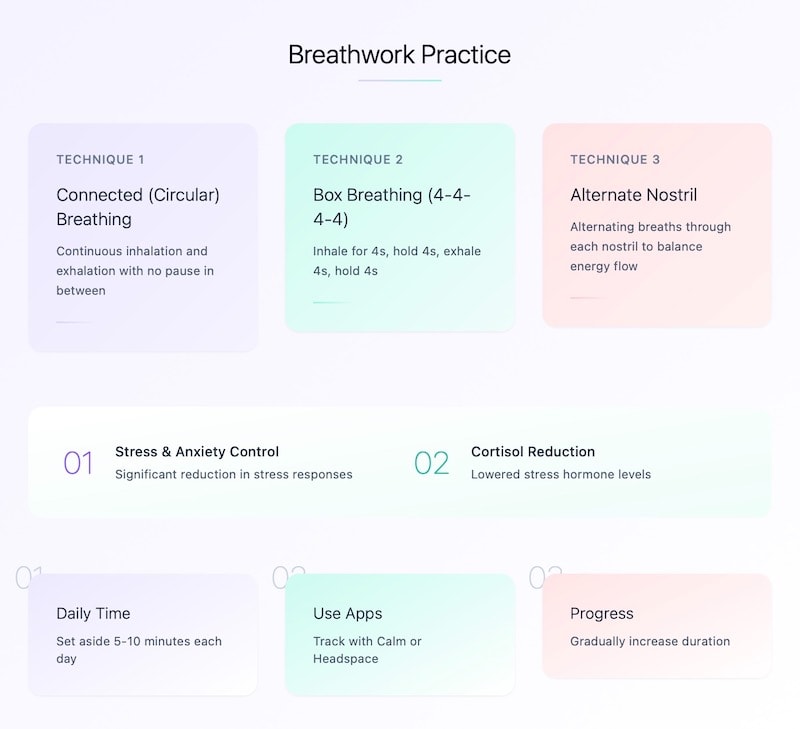
Actionable Steps
-
Set Aside Time Daily: Dedicate at least 5–10 minutes each day to practice breathwork techniques.
-
Incorporate into Your Routine: Use connected breathing in the morning to energize your day. Try box breathing before bed or during moments of high stress to calm your mind.
-
Track Progress: Use mindfulness apps like Calm or Headspace to guide your breathwork sessions. Gradually increase practice duration as you become more comfortable.
Pro Tips for Maximizing Benefits
-
Combine breathwork with other holistic practices like yoga or meditation for enhanced results.
-
Pair breathwork with grounding exercises such as walking barefoot to amplify relaxation.
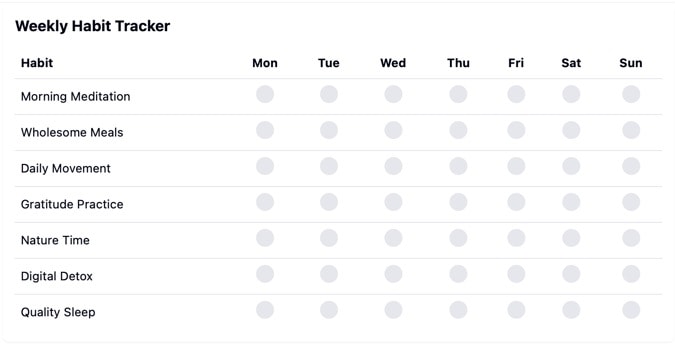
Pro Tip: Build Holistic Habits the Easy Way with Atomic Habits
Building new habits can feel overwhelming, but it doesn’t have to be! James Clear’s Atomic Habits taught me that small, consistent changes are the secret to making habits stick. Here’s how you can use his tips to embrace holistic habits in a way that feels natural and doable:
-
Make It Obvious: Set up little reminders for yourself. For example, leave your gratitude journal on your pillow so you see it before bed, or place a water bottle on your desk to remind you to stay hydrated.
-
Make It Fun: Pair your habit with something you love! I like to play relaxing music while I do breathwork or enjoy my favorite herbal tea as part of my evening wind-down routine.
-
Start Small: Don’t try to do everything at once. If 10 minutes of meditation feels like too much, start with just 2 minutes—you’ll be surprised how quickly it adds up!
-
Celebrate Your Wins: Give yourself credit for showing up, even if it’s just a small step. Did you take a short walk today? Amazing! That’s progress worth celebrating.
The key is to focus on small, manageable steps and make them enjoyable. Over time, these tiny changes can create a ripple effect that transforms your life in ways you never imagined!

When I look back at my own journey, I'm amazed at how these simple habits have transformed not just my health, but my entire perspective on wellbeing.
What started as small changes – a morning meditation here, a mindful meal there – has blossomed into a way of life that feels natural and nurturing.
From my experience supporting others in their wellness journeys, I've seen how starting small creates lasting change. You don't need to revolutionize your life overnight. Perhaps you'll begin with a morning walk in nature, letting the sunrise reset your rhythm.. Or you might find peace in a few minutes of mindful breathing between meetings.
The beauty of these holistic habits lies in their ripple effect – as one area of your life transforms, others naturally follow. Your improved sleep leads to better food choices. Your daily movement practice brings mental clarity. Your gratitude practice deepens relationships.
It's all beautifully interconnected!
Remember, this it is not about perfection but progress and listening to your body.
Start where you are, with what calls to you most. Trust that each small step forward creates positive change, and celebrate your journey toward a more balanced, vibrant life.
I'd love to hear which habit resonates most with you, or what questions you have as you begin exploring holistic living. Share your thoughts in comments!
Key Takeaways:
-
Master mindfulness: Incorporate meditation or practice being fully present in everyday moments. Mindfulness can help reduce stress and improve focus, creating a sense of calm and clarity.
-
Nourish your body: Shift your mindset to see food as medicine and fuel. Prioritize vibrant, whole, plant-based foods, and consider incorporating intermittent fasting or nutrient-dense juices to support your health.
-
Move your body every day: Engage in enjoyable daily movements like walking, yoga, or bodyweight exercises to boost physical health, reduce stress, and enhance mental well-being.
-
Practice gratitude and self-compassion: Reflect on the positives in your life through gratitude journaling or bedtime reflections. Pair this with self-care rituals to nurture kindness toward yourself.
-
Go outdoors and connect with nature: Spend at least 20 minutes in green spaces daily to lower cortisol levels, clear your mind, and feel more grounded.
-
Foster healthy relationships: Strengthen meaningful connections by investing time in loved ones, practicing active listening, and joining communities that align with your interests.
-
Take time away from screens: Unplug from the digital world by creating screen-free zones or scheduling detox days. Use this time to engage in activities that bring you joy and relaxation.
-
Incorporate hot and cold exposure: Build resilience by alternating between cold plunges and sauna sessions. These practices improve circulation, reduce inflammation, and boost adaptability.
-
Prioritize restful sleep: Treat sleep as a cornerstone of health by creating a calming bedtime routine, optimizing your sleep environment, and aiming for 7–8 hours of quality rest each night.
-
Practice breathwork: Harness the power of intentional breathing techniques like box breathing or connected breathing to reduce stress instantly, improve focus, and enhance emotional balance.













